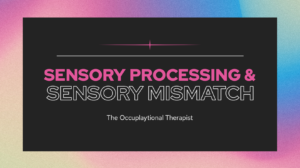The last thing that I wanted you to know this week, as I wrap up my talks about sensory mismatch (the other four posts are here: one, two, three, four), is that kids will typically become better at managing this mismatch themselves over time, so you don’t have to feel like this will take active constant conflict resolution on your part forever and ever.
You’re creating the next generation with more tools than you ever had, because they won’t grow up and feel the same way that you will. This won’t be new to them the way it is to you. This will be something they’ve known for years of their life, had support in, had help with, had practice doing. That’s a really empowering thing.
Imagine if someone had explained to you as a child: “your brain alerts to small sounds and that’s why it’s hard for you to pay attention to your work in class, because the class is full of small sounds even when everybody tries to be quiet. You’re not a bad kid. You just have a cautious brain. Your brain is trying to protect you and we need to figure out how to play a sound that will cover up all the small sounds. Maybe some music or a fan noise? What do you think?”
Imagine if someone had explained to you as a child, “Did you know that brains can make more connections faster when your body is moving? You’re not a bad kid. You actually have a pretty smart brain, your brain knows that if it would just move around, it would probably be able to understand better. It’s not your fault that some grown-ups don’t understand that. We’re going to find a good way for you to move around that they’ll be okay with. Maybe moving your feet or your hands?”
Maybe neither of those applied to you as a kid, but something else did. Or maybe none of this really felt like it applied to you as a kid, maybe you were really successful in the systems the way they were, but now you see your own kid struggling at school or at home. We can change this for the next generation. We totally can.
When there is a sensory mismatch, it can be easy to focus all of the frustrated problem-solving energy on the kid, and end up being angry at the child or taking it out on them. But listen. The world is really complex. Sometimes grown-ups have lots of factors that we have no control over. We may not be able to change school administrative expectations or which teacher’s classroom our kid is in, we may not be able to change sibling relationships or past trauma or illnesses or destabilizing life events. There may be tons of factors that adults don’t have control over and then the adults are struggling with that loss of control.
AND, additionally, there’s one more factor you don’t have control over, and it’s your kid’s sensory processing style. But for some reason, that latter one feels like it should be attributed to “behavior”, like your kid should just shape up and do things the “normal, easy” way and make everybody’s life “easier”. Adults usually know that they can’t directly control huge, governmental, societal, global factors. But adults, especially if they were raised in a controlling paradigm, might feel like they ought to directly control their kids. Or blame all of the cumulative difficulty from all of the factors on the one thing their kid is doing that’s also uncontrollable.
It’s easier to blame the one, tangible, thing right in front of you…the one you might be able to yell or punish or reward or manipulate.
And it’s hard and painful and vulnerable to admit that it’s actually one more thing that you can’t control.
But it’s not the child’s fault that there are huge, governmental, global, societal factors making things complicated out there in the world, and it’s still not their responsibility to *not* be a child just because of those things existing out there. A child’s job is to be a child, and they’re not doing anything wrong for that. And *you’re* not doing anything wrong for it being difficult to give them space to do that. Sometimes it’s just a struggle. Sometimes things are just hard.
We’re used to that—“sometimes things are just hard”—in life. It’s harder in parenting. And It’s not wrong or anything to keep striving to make things better and keep finding creative ways to problem-solve. It’s just also not a sign of failure if things are just hard. Things are, sometimes, just hard.
Solving sensory mismatch is hard. But it’s not impossible. I hope that this week’s post series has given you some tools to figure out some of the best ways you can do that.




